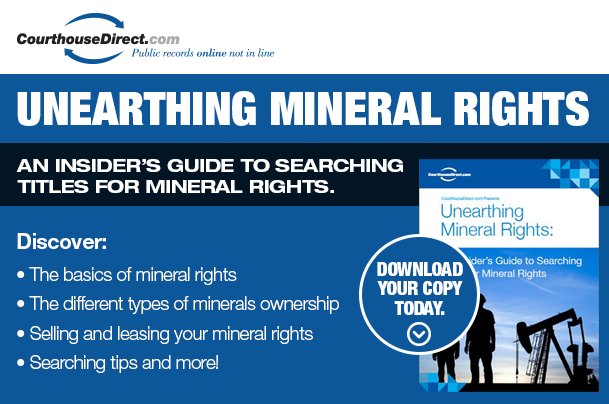 When you own land in Texas, your “estate,” or property you own, is split into two - you have the surface estate and a mineral estate. Within municipalities, the local government typically owns the mineral estate, but out in the wide-open spaces, large chunks of land can be wholly owned by an individual or entity.
When you own land in Texas, your “estate,” or property you own, is split into two - you have the surface estate and a mineral estate. Within municipalities, the local government typically owns the mineral estate, but out in the wide-open spaces, large chunks of land can be wholly owned by an individual or entity.
If a property owner wishes, they can divide the surface and mineral interests or estates, and sell or lease the mineral rights to another entity, such as an oil and gas exploration company. In order to make a profitable sale, you need to have a better idea of what minerals you own and what they are worth.
Beyond the desire to sell or lease mineral rights, you may have cause to appraise your mineral holdings for other reasons, which we will get into in this post. In any case, you need to know the factors affecting the value of your mineral rights, how an appraiser approaches a mineral appraisal, and which documents you need.
What Is a Mineral Appraisal?
A mineral appraisal is a valuation to assist in transacting mineral rights. Transfer of ownership, leasing, and other issues may require you or an agency to have a better idea of your minerals' value.
A mineral appraisal identifies which minerals you own, where it is located, what type of property the minerals are in, and how much you own. In most instances, we are talking about oil and gas, although other minerals may be found.
Factors Affecting the Value of Your Mineral Rights
An array of components to consider when performing a valuation. The first should be familiar to those dealing in real estate - location.
Oil and gas are most likely to be located near a US basin or shale play. Location includes the underlying geology of your property. It impacts how difficult it may be to extract the minerals for production.
Other factors include:
- Production
- Industry activity
- Types of hydrocarbons present
- Commodity prices
- Whether the mineral rights are leased or not
Production concerns whether the wells that may be present have already been producing for an extended period. Mineral plays that have been mined for decades may present a risk of playing out or being depleted.
If there is no production right now, your mineral rights may be valued lower because there is no proof the minerals can be successfully retrieved. However, various oil and gas companies may see potential in various formations or consider secondary recovery in their plans.
Industry activity is a factor telling the appraiser whether there are highly productive wells near your property. The presence of production in the area increases the likelihood that your property will produce something of value.
The types of hydrocarbons present and commodity prices have significant impacts on the value of your mineral rights. The predominance of oil or gas makes a big difference. Typically, oil prices are higher than gas prices. If gas is present, what else is available to sell, like associated liquids?
Horizontal wells tend to produce higher quantities than vertical wells. Which type of well is present or needed to extract your minerals?
Commodity prices fluctuate wildly and always have. The price of oil and natural gas goes up and down like a yoyo. Timing is everything when selling hydrocarbons.
If your minerals are not leased, or the lease is near its end, they are more valuable than those tied up at the beginning of a lease or in a long term lease. The royalty fraction is the primary concern for leased wells because it affects future cash flow. Contract language is the next significant factor in royalties, computation, and deductions.
Documents Required for Appraisal
Putting together the paperwork can take a lot of legwork, but CourthouseDirect.com can reduce some of that. Our databases are accessible online, and you can retrieve many of the following documents over the web.
Required documents include:
- The mineral deed
- Any oil and gas leases
- Correspondence from any operators enumerating the net mineral acres you own
- Understanding of the percentage of ownership you have if the minerals have never been leased
- Check stubs and revenue statements
- Division orders, state oil and gas commission filings
- Estate documents, landman paperwork, or engineering reports of valuation or reserves
- Recent offer letters
You can get a property appraisal from CourthouseDirect.com that includes most of the information you need for a mineral appraisal, including the legal description, deeds, acreage, and other vital information.
Three Approaches to Mineral Appraisals
You can perform mineral appraisals using three different methods.
- Sales comparison approach - provides transaction benchmarks developed from public and private sales on or before the effective date of the appraisal.
- Cost approach - estimates the cost to reproduce the property or create a comparable property. It adds the cost of land and production equipment less depreciation. This approach is not often used in the oil and gas industry.
- Income approach - estimates value by calculating future cash flow then discounting it back to today’s dollars. This is the most commonly used approach in the industry. However, it gets complicated fast because of several factors discussed above. This approach is sometimes looked at as an educated guess.
If more than one approach is used, the appraiser can reconcile the values reached to provide a final opinion of value. The appropriateness of each method weighed against the quantity, quality, and reliability of the data supporting it renders a defensible final opinion along with narrative support.
Why Would You Need a Mineral Appraisal?
First up is the IRS. They know what you do when it comes to financial transactions, and they want to ensure they get their cut. You may need an appraisal because you inherited an estate with mineral rights, are getting divorced and jointly own mineral rights, or considering a sale or gift of those rights to someone else.
If you want to sell your rights, you definitely need an appraisal so you can set a fair and profitable price, or find out whether it’s worth it to sell. You probably get mail asking to buy your mineral rights. How do you know whether the offer is right? You get a mineral appraisal.
A mineral rights appraisal may be necessary if you want to qualify for Medicaid. Eligibility for most government services requires data about your financial picture.
Who Should Perform Your Appraisal?
Above anything else, your appraiser must be unbiased. The only way to guarantee the lack of bias is to hire an independent appraiser who is not affiliated with an oil and gas company or another firm.
Your appraiser has a very particular set of skills, including business, finance, engineering, geology, and appraisal theory, making them more suitable for your purpose than surface appraisers or other real estate types.
If you own the mineral rights under your land and are thinking of selling or needing to get a valuation for other purposes, consult with CourthouseDirect.com to retrieve documents and provide appraisal services. We are an independent and unbiased firm. In any case, use this post when looking for a mineral appraiser to help you select the one that fits your needs.























